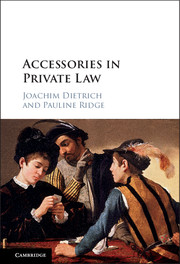Foreword
Published online by Cambridge University Press: 05 February 2016
Summary
For some years now I have had the hope that Joachim Dietrich and Pauline Ridge, both former students of mine, would address together this greatly under-analysed, but practically very significant, subject. It has now come to pass. Their's is an important publication, and a much needed one. It obviously required mastery of major parts of the common law, equity and statute. It warranted – and received – considerable comparative treatment of the laws of other common law jurisdictions (beyond England and Australia), and especially of the United States. From these it is apparent they derived both helpful insights and, I venture, reassurance. As I anticipated, the authors have displayed an informed understanding of the methodology, the inspirations and the inevitable complexities of judge-made law. This saved their work from the allure of over-simplification, a common vice when one is seeking to bring cohesion and harmony to judicial utterances drawn from disparate bodies of law. I will return to this last theme below.
Beyond the criminal law of accessory liability (to which a chapter usefully is devoted), Anglo-Australian common law has displayed little by way of explicit acceptance, let alone development, of a jurisprudence focused on accessory liability for civil wrongs as such. There is not, for that reason, a readily available common language to which the authors could turn. Yet at the peripheries of quite some number of bodies of law – be they common law, equity-related or statutory – there has been the recognition that, at least in some circumstances, a third party's involvement in another's civil wrongdoing (be it a particular tort, a breach of contract, an equitable wrong, a misuse or misappropriation of property, or a breach of statutory duty) could result in that person being held liable to an injured plaintiff for, or on account of, that other's wrong. But as the authors acknowledge, accessory liability by no means provides the sole basis for imposing liability on a third party.
Necessarily they needed to give considerable explanation of what differentiates accessory liability from other species of third party-liability. Much of this, I should add, required them to differentiate a variety of possible third-party liabilities which can arise particularly in tort law, and in equity. The tort of conspiracy and claims against third-party recipients of trust property, or of equitable interests in property, demonstrate why this is necessary.
- Type
- Chapter
- Information
- Accessories in Private Law , pp. xvii - xxPublisher: Cambridge University PressPrint publication year: 2016



